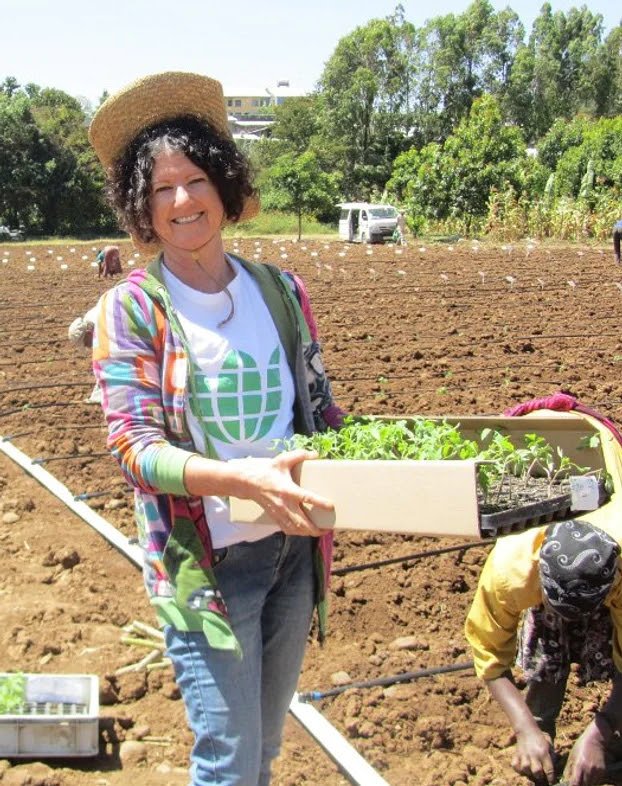Good and Evil: A True Story
Updated: November 26, 2023
I've written to you in recent weeks and shared the Wall Street Journal editorial about the kidnapping of Dr. Shoshan Haran, a remarkable Israeli woman I knew who had devoted her life to helping impoverished farmers in Africa, many of them Muslims. While every hostage equally deserves to be released, because I knew Shoshan, I felt a special need to do what I could to raise awareness of her plight. By sharing her story, I hoped I was helping to make clear the cruelty and brutality of Hamas on October 7 and beyond, and that pressure would grow to return all of the hostages.
Yesterday, Shoshan, her daughter and two granddaughters were released from captivity in Gaza. (I don’t know the status of other family members who were reported to have been kidnapped along with Shoshan.) As I reported earlier, Shoshan’s husband and brother-in-law were murdered by Hamas terrorists on October 7.
This is an awful period for those of us who believe in Western values, with hostage taking and barbaric medieval practices not only accepted but cheered by so-called elites. And for supporters of Israel, it is a grim time with Hamas having the upper hand in the military conflict because they were willing to take hostages and to use them for the benefit of the terrorists in Gaza.
But good news is still good news, and the return to freedom for Shoshan and some of her family is unquestionably very good news. Let’s hope that the remainder of the hostages are soon returned to safety.
October 19, 2023
You likely don’t know the name Dr. Shoshan Haran.
I met Shoshan, a world-renowned plant seed developer, while doing research for what became Let There Be Water: Israel's Solution for a Water-Starved World. Shoshan helped me to understand how Israeli non-GMO plant breeders had developed drought-resistant crops and plants that thrive on otherwise unusable brackish water. But at the top of her career, Shoshan had an epiphany: Instead of using her extraordinary abilities to help farmers in rich countries get ever-better seeds, she would devote the rest of her life to helping poor farmers in Africa. “No one,” she told me, “was developing specific seeds for places like Ethiopia.” Farmers there had to make do with generic seeds for their crops.
An urbanite like me didn't know this, but seeds can be developed for particular places, with changes made for local climate, water sources, soil type and pests. Shoshan started a not-for-profit called Fair Planet with the intention of developing seeds for those poor African farmers as precise as the ones she had been helping to create for American and European farmers.
The project succeeded beyond anyone’s expectations. In the first season using Shoshan’s tomato seeds created for central Ethiopia, farmers there saw a 500 percent increase in yield. Not only did this help to address issues of hunger and nutrition for those farmers and their families, but household income rose helping to lift communities out of abject poverty. In the ten or so years since, approximately one million farmers in several African countries have been using seeds developed by Fair Planet. In other words, Shoshan Haran is a hero, a person who has made the world so much better for her having lived.
Now for the hard part.
On October 7, Shoshan and her family were together in her home on Kibbutz Be’eri, a successful communal farm established by her father and the place where she was born. In all, there were ten family members gathered – Shoshan, her husband, her sister and brother-in-law, her daughter and son-in-law and their two children, her husband’s sister and the sister’s husband. They were all taken captive by the Hamas terrorists who invaded the kibbutz. In recent days, the remains of Shoshan’s husband and brother-in-law have been identified. As best as is known, Shoshan and the other seven family members – three generations – are hostages in Gaza, but no one knows for sure.
It is easy to recognize this as evil harming far more than Shoshan and her family. Those many African farmers, and many others, are also harmed by the Hamas assault. It would also be reasonable to say that there are two competing ideologies at work here: One by incrementally helping others in peaceful ways and the second using horrifying and indiscriminate violence to achieve its goals. For me, I have been depressed, enraged, struggling to make sense of the terror attack, but now that I have learned one of the captives is someone I know and have hosted in my home, it is also personal. I hope the governments of Africa will join in with others to try to get Shoshan and her family freed from captivity, assuming they are still alive. Perhaps you, too, can try to publicize this story, sharing it with others. Every one of those being held deserves to be released, but showing how terrible it is to have a person like Shoshan in captivity perhaps helps to transform a general act of criminality and evil into something concrete and harder to ignore.
Over time, many more stories of October 7 victims will be learned. Just knowing Shoshan’s story offers clarity that so much more than the lives of the victims and the captives are affected.
Dr. Shoshan Haran
